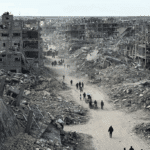
Civil society actors and international human rights organisations working in the Democratic Republic of Congo are very concerned by the decision of the government of Félix Antoine Tshisekedi Tshilombo to lift the moratorium on the execution of the death penalty, communicated by circular note No 002 of 13 March 2024.
The circular note signed by Minister of State Rose Mutombo Kiese, Minister of Justice and Keeper of the Seals, justifies the decision “with a view to ridding the DRC army of traitors on the one hand and curbing the resurgence of acts of urban terrorism resulting in the death of men on the other”.
The signatory organisations deplore this decision, which violates the constitutional principle of the sanctity of human life and constitutes a major step backwards in terms of respect for human rights and democracy.
The death penalty has never been abolished in the Democratic Republic of Congo, although there has been a moratorium on its execution since 2003. During this period, it continued to be handed down by Congolese courts, but was replaced by life sentences.
The use of the death penalty constitutes a violation of human rights, in particular the right to life and the right never to be subjected to torture or cruel, inhuman or degrading treatment or punishment.
The Congolese state recognises in its 2006 constitution and through its signature of the International Covenant on Civil and Political Rights (ICCPR) and the African Charter on Human and Peoples’ Rights that the right not to be subjected to cruel, inhuman or degrading treatment is an inviolable right that should not be infringed under any circumstances.
With this circular, the government is attacking the right not to be subjected to cruel, inhuman or degrading treatment, which capital punishment represents.
This decision irrevocably raises civil society’s concern about the government’s use of opportunistic and inappropriate political measures to respond to serious security problems that require other types of responses. Moreover, there is no empirical evidence that shows that the death penalty is effective in curbing violence, contrary to the arguments put forward by the Congolese authorities.
In addition to questions about the domestic and international legality of the measure, its implementation raises a number of issues, the most worrying of which are :
- The capacity of the Congolese judicial system to guarantee compliance with fair trial criteria, regarding to :
– its fragility and major malfunctions ;
– high risk of miscarriages of justice ;
– the possible use of the death penalty to settle scores. - The terms used in the circular pave the way for death sentences for a wide range of crimes and offences.
- It questions the Congolese state’s ability to remain a credible interlocutor in terms of international judicial cooperation, at a time when the country wants to embark on an inclusive transitional justice process to consolidate peace and fight impunity for actors inside and outside the DRC who are responsible for serious human rights violations.
The signatory organisations reiterate that capital punishment is not an appropriate response to the challenges facing the DRC; on the contrary, it consolidates the institutionalised use of violence as a response to societal problems and the structural causes of conflict in the DRC, thereby fuelling cycles of violence in the country.
The signatory organisations recommend that the government take appropriate structural measures to foster loyalty within its security forces and to combat urban crime effectively. The signatory organisations urge the government to revoke the lifting of the moratorium and to continue its efforts to abolish the death penalty from the legal system once and for all, as the moratorium should only be a provisional step in this direction.



